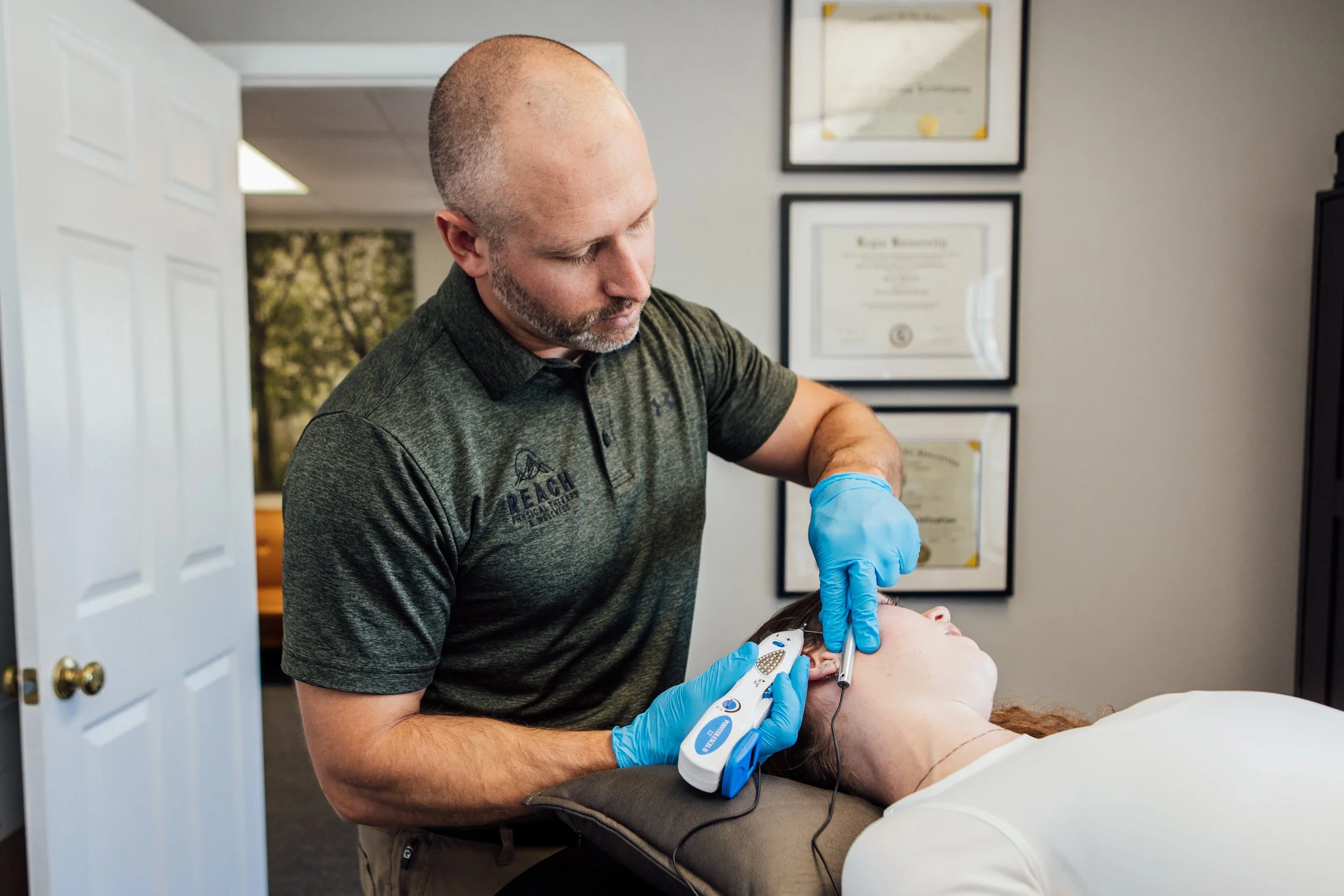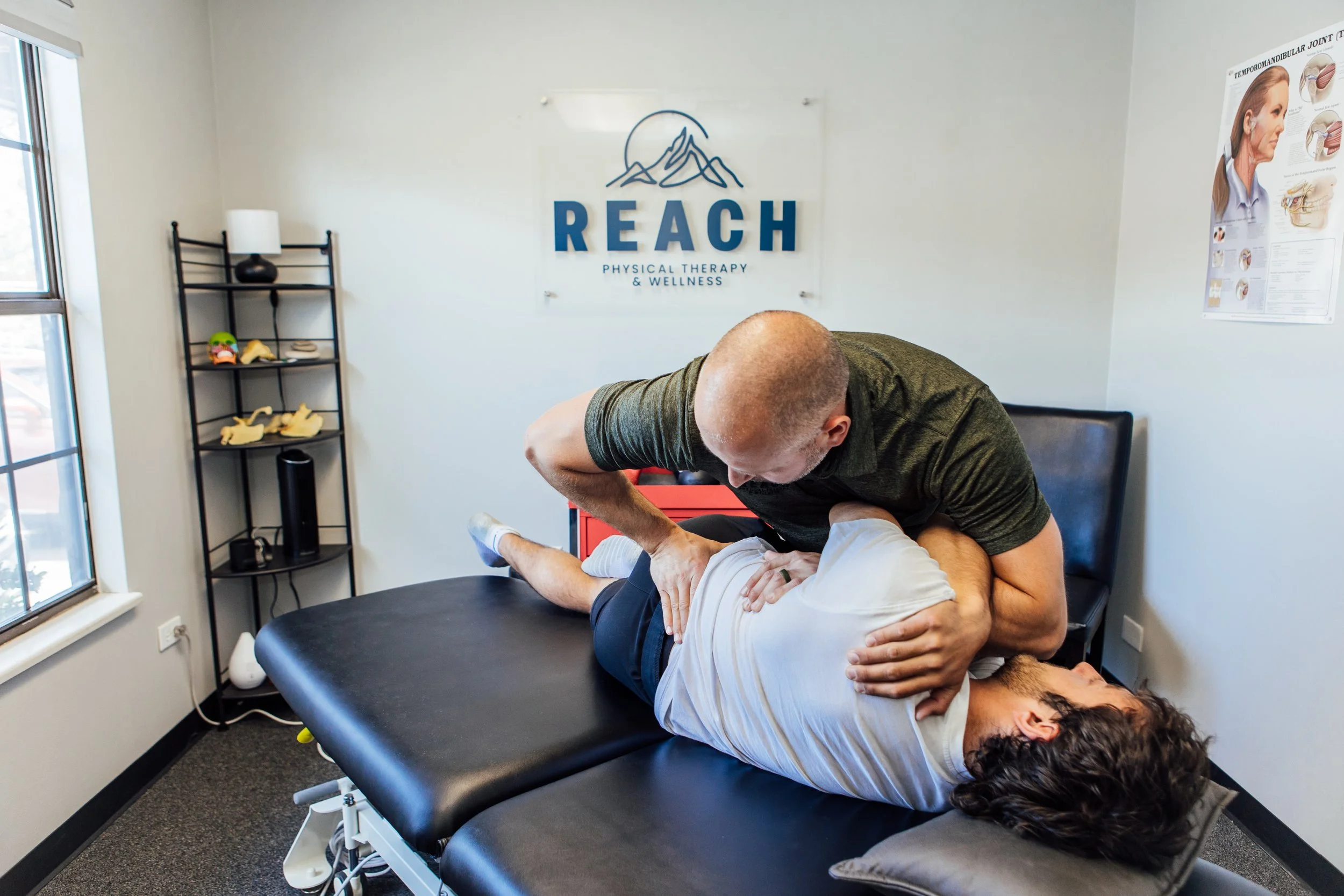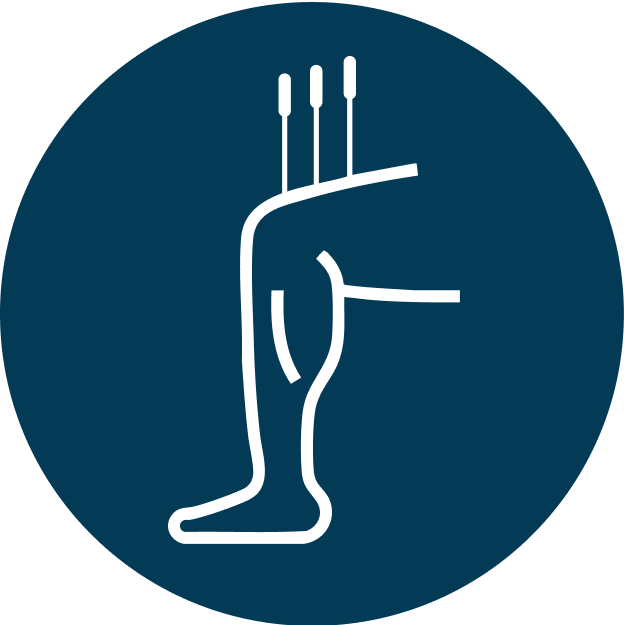
Reach a Life Free from TMJ Pain and Headaches
Whether you want to play with your kids, go on adventures, enjoy wonderful food, garden, compete, or just get a good night's sleep—a full life without pain is the sole mission at Reach Physical Therapy & Wellness.
FIND RELIEF
Personalized, Proven Physical Therapy Treatments
for TMJ, Headaches, and More
OUR SPECIALTIES
At Reach Physical Therapy & Wellness, we specialize in targeted, one-on-one care for complex conditions like TMJ disorders, chronic headaches, neck pain, and jaw dysfunction. Our treatments are grounded in advanced clinical training and tailored to your unique needs—no cookie-cutter programs, no rushed sessions. Whether you're struggling with jaw pain, muscle tension, or mobility limitations, our expert care is designed to help you heal faster and return to the activities you love.
Explore our full range of services below to see how
we can help you move, feel, and live better.
TMJ + Jaw Pain
Tempromandibular Joint
Disorders (TMJ)
Facial Myalgia/Pain
Painful Chewing
Facial Injuries
Sleep Disorders
Trigeminal Neuralgia (TN)
Headaches
Chronic Headaches
Tension Headaches
Migraines
Foggy Thoughts
Stiff Neck
Whiplash Recovery
Sports Injury & Spine
Expert at diagnosing & treating musculoskeletal disorders from active
Colorado lifestyles & sports
Spine injuries from auto accidents to sports injuries
Manual
Therapy
& Dry Needling
Pain & neuromuscular disorders
General injuries
Pre- & post-surgery rehabilitation
Automobile injuries
Work-related injuries
Surgery prevention
TMJ Pain FAQs
Temporomandibular joint (TMJ) pain is a common issue that many people experience. Here are some frequently asked questions about TMJ pain:
-
TMJ pain refers to discomfort in the temporomandibular joint, located just in front of each ear, where the jawbone connects to the skull. Pain may occur with everyday tasks like chewing, talking, yawning, or even smiling.
-
TMJ pain can be caused by a range of issues including jaw injury, teeth grinding (bruxism), arthritis, stress, poor posture, or habitual behaviors like nail biting, chewing on objects, or clenching the jaw. Muscle tension and inflammation are common contributors.
-
Symptoms may include:
Jaw pain or tenderness
Clicking, popping, or grinding sounds
Difficulty opening or closing the mouth
Headaches and facial pain
Neck (cervical spine) discomfort
Pain while chewing or yawning
Locking of the jaw
TMJ symptoms often overlap with other issues, so an accurate diagnosis is key.
-
Diagnosis begins with a thorough physical exam of the jaw and cervical spine, along with a full review of your dental, medical, sleep, and airway history. In some cases, imaging such as a Cone Beam CT scan or MRI may be recommended to assess the joint and surrounding structures.
-
Most TMJ conditions respond well to conservative care. Treatment may include:
Applying heat or ice
Eating soft foods (a good rule: if you can cut it with a fork, it’s soft enough)
Postural and relaxation techniques
Avoiding elective dental work during recovery
Physical therapy and hands-on manual therapy
Natural supplements or over-the-counter medication
Possibly an oral appliance
The key takeaway: most TMJ patients respond well to conservative care. Surgery should always be the last resort.
-
Yes—stress can cause clenching, grinding, and muscle tension that lead to or worsen TMJ pain. Interestingly, some medications used to treat stress, anxiety, or depression can also increase jaw muscle activity. (See our related blog post for more info.)
-
While not always "curable," TMJ pain is highly manageable. Most cases resolve or improve significantly with expert-guided conservative care. Rare cases involving fractures, tumors, or severe joint degeneration may require more advanced interventions.
-
Yes. Specific jaw exercises, gentle stretches, and postural correction routines can help restore mobility and reduce pain. However, exercises should only be done under the guidance of a provider trained in treating TMJ disorders to avoid worsening the condition.
-
It depends on the severity, cause, and how early it’s treated. Many patients feel significant relief within a visit or two. In more complex cases, it may take 6 to 12 months to reach a stable, long-term improvement.
Clinic Location
7200 East Dry Creek Road
Unit G-102
Centennial, CO 80112
Ready to reach for your full potential?
FAQs
-
7200 E Dry Creek Road, Suite G-102, Centennial, CO 80112
-
Our visits are cash pay, We do not accept insurance. This allows us to treat patients for as long as needed versus being on the insurance company’s timeline. We work on the patient’s timeline.
If you check your out-of-network benefits, it may be possible for you to be reimbursed directly. Reach Physical Therapy & Wellness will provide appointment notes and billing information for you to submit to your insurance and/or FSA/HSA accounts. -
It depends on each patient, their diagnosis, their progression, and their overall goals. Our goal is for each patient to return to their life and favorite activities stronger than before treatment.
-
Reach Physical Therapy & Wellness accepts payment through cash/checks, Zelle, and Apple Pay.
-
Manual therapy and dry needling
Cranial Facial Pain
-TMJ pain
-Cranial/facial pain
-Headaches
-Disorders involving the upper cervical spine
-Temporomandibular joint TMJ facial myalgia.Sports Injury and Spine
-Expert at diagnosing and treating musculoskeletal disorders from active Colorado lifestyles and sports
-Spine injuries from auto accidents to sports injuriesManual Therapy
-Pain and neuromuscular disorders
-General injuries
-Pre- and post-surgery rehabilitation
-Automobile injuries
-Work-related injuries
-Surgery prevention -
Dr. Lyle is the only physical therapist in Colorado with a Cranial Facial Certification and one of less than 100 physical therapists in the United States to hold this certification.
He graduated from the University of Wyoming before earning his Doctor of Physical Therapy degree from Regis University in 2013. As a lifelong learner, he continues to pursue extensive continuing education—in advanced certifications—to ensure he’s using the best tools and techniques for each patient.
Dr. Lyle McKissick grew up in Wyoming, surrounded by mountains, forests, and wild-open terrain. His life has always revolved around outdoor recreation and active adventures—and still does.
When he’s not helping people get back to what they love, Dr. Lyle is rafting on a river, mountain biking, skiing, camping, and adventuring with his wife and two daughters.









